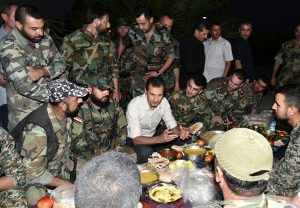
By Stephanie Nebehay
GENEVA (Reuters) – U.N. war crimes investigators called on Syria on Wednesday to tell families what happened to their relatives who disappeared and provide the medical records and remains of those who died or were executed in custody.
No progress can be made towards a lasting peace to end the nearly eight-year-old war without justice, the International Commission of Inquiry on Syria said.
After years of government silence, Syrian authorities this year released “thousands or tens of thousands” of names of detainees alleged to have died, mostly between 2011 and 2014, it said in a report released before delivery to the U.N. Security Council.
“Most custodial deaths are thought to have occurred in places of detention run by Syrian intelligence or military agencies. The Commission has not documented any instance, however, where bodies or personal belongings of the deceased were returned,” it said.
In nearly every case, death certificates for prisoners that were provided to families recorded the cause of death as a “heart attack” or “stroke”, the independent panel led by Paulo Pinheiro said.
“Some individuals from the same geographic area share common death dates, possibly indicating group executions,” it said.

FILE PHOTO: Syria’s president Bashar al-Assad (C) joins Syrian army soldiers for Iftar in the farms of Marj al-Sultan village, eastern Ghouta in Damascus, Syria in this handout picture provided by SANA on June 26, 2016,./File Photo
In most cases, the place of death was stated as Tishreen military hospital or Mujtahid hospital, both near Damascus, but the place of detention was not named, it said.
“Pro-government forces and primarily the Syrian state should reveal publicly the fates of those detained, disappeared and/or missing without delay,” the report said, noting this meant Syrian government forces, Russian forces and affiliated militia.
Families had the right to know the truth about their loved one’s deaths and be able to retrieve their remains, it said.
In a 2016 report, the panel found that the scale of deaths in prisons indicated that the government of President Bashar al-Assad was responsible for “extermination as a crime against humanity”.
In Syria, a family member must register a death within a month after receiving a death notification, the report said. Failure to do so results in a fine which grows after a year.
But given that there are millions of Syrian refugees abroad and internally displaced, many are not in a position to meet deadlines, it said.
The lack of an official death certificate may affect the housing, land and property rights of relatives, it said, noting that female-headed households may face further challenges to secure inheritance rights.
(Reporting by Stephanie Nebehay, Editing by William Maclean)


